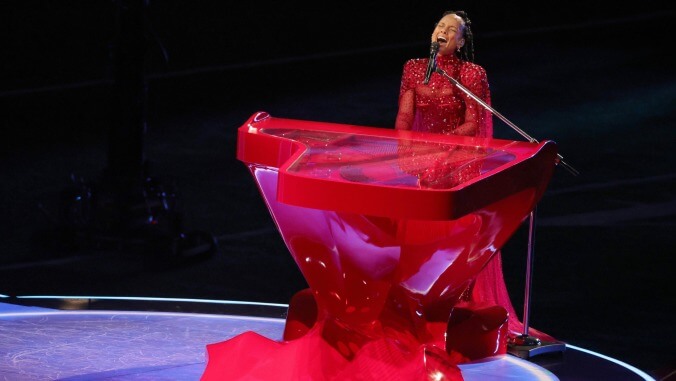Alicia Keys' Super Bowl flub already erased from the official record
Alicia Keys sounded less-than-perfect during the Super Bowl Halftime Show, but you wouldn't know if you watched the YouTube version

The growing danger of the Internet is that we won’t be able to trust what we see or hear. It’s already pretty easy to spread misinformation on social media, but as artificial intelligence and deepfakes become more precise and accurate, it will be even harder to separate fact from fiction. Maybe it’s a little dramatic to apply this logic to the editing of Alicia Keys’ Super Bowl Halftime Show performance, but the truth is, reality is already being tweaked before our eyes.
In this case, millions of people watched (and heard) Keys’ voice strain and crack on the opening notes of “If I Ain’t Got You,” which she played before transitioning to her duet with Usher, “My Boo.” Fans reacted by teasing Keys for being off-key, and a video still exists on the web of the singer—who is a tremendous vocalist—briefly struggling with the song. But if you watched the performance after the fact via the NFL’s official YouTube page, you won’t hear any sign of imperfection; the voice crack has been smoothed over, presumably autotuned into something more soothing on the ear. You can see both versions below:
There’s precedent for something like this being done—an (in)famous example is when Saturday Night Live uploaded a version of Jennifer Lopez’s 2010 performance of “Until It Beats No More” with the raw vocals instead of a mixed version. In both cases, unless you witnessed the performance live—or unless some helpful Internet archivist preserved it and delivered it to your feed—you wouldn’t necessarily know there was any imperfection in the original version. The differences between the original and the edit are truthfully minimal in both. What makes the Keys example significant is the scale; the Super Bowl Halftime Show has a much larger audience than a random episode of Saturday Night Live.
@itsshannonburns #jenniferlopez #snl #ayoedebiri ♬ original sound – Shannon Burns
Still, it’s not a clear-cut act of censorship to alter one small mistake out of a Super Bowl performance. There have been much larger, much more public and visible gaffes on the Halftime Show stage: Justin Timberlake and Janet Jackson’s “Nipplegate” or M.I.A.’s middle finger, for example. That’s what makes it all the more curious how quickly Keys’ minor flub was struck from the record. It wasn’t a scandal or even really a mistake. It was an incredibly brief moment of human weakness, a raw reminder that she was performing live with her actual voice in front of a crowd of thousands.
Perhaps the reason why it was edited is because the Halftime Show is now sponsored by Apple Music; given that it’s a streaming platform, the brand is more invested in making sure the audio it produces is high quality. (The A.V. Club has reached out for comment.) Whether Apple was behind the tweak or not, the change erases what is exciting and enjoyable about live performances: the element of uncertainty and vulnerability, that anything can happen onstage, that what we’re hearing isn’t just the same thing we can get on Spotify. That what we’re hearing is real.
“Real” is the operative word. While a tiny edit of Alicia Keys is not at all approaching the danger of a Joe Biden deepfake spreading lies about public safety, it still represents an alteration to reality. Sure, we all know now that the Halftime Show video was edited, but what about five, ten years from now, when you’re trying to remember what Usher sang and you click the first video you find from the 2024 Super Bowl? Will you remember, while you’re watching, that it didn’t sound quite like that on television? Does it matter that the version on the official record isn’t “real”? Will “real” mean the same thing then as it does now?